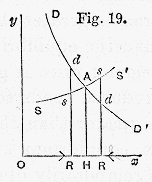ScienceRocks
Democrat all the way!
- Banned
- #1
Maybe we should govern our nation by the laws of economics??? Sounds like a idea 
Microeconomics - Wikipedia, the free encyclopedia
Raising the price of a product may make it unaffordable for the consumer that can't afford that price. Equilibrium is the line where the price to the supplier crosses the max amount of demanders(people that want burgers). As you increase the cost to pay for worker that want $15 instead of 7.5 you add the cost of everything else + that increase ontop. This normally = the price of the good(burgers) increasing. On the map below you show how the demand goes down as you are forced to raise the price????
Let's take me as a point on this graph...I hardly want to eat fast food as it is too expensive already. This means that I'm outside of the shaded area and by raising the price even more moves it even further away from me.

Economic equilibrium - Wikipedia, the free encyclopedia
So we have to 1. consider how much does rent or taxes cost for the building, 2. cost of the good???? 3. Pay of the workers.
Then 4. we have to consider competition from other fast food joints.
Can we raise the wages to $15 dollars per hour? You know the demand will be less even with the higher price of the good to give the worker more wages.
You know the demand will be less even with the higher price of the good to give the worker more wages. 
Outside forces like competition as I said is also very important as other fast food joints can steal customers away.
Think about this.
Microeconomics - Wikipedia, the free encyclopedia
Typically, it applies to markets where goods or services are bought and sold. Microeconomics examines how these decisions and behaviors affect the supply and demand for goods and services, which determines prices, and how prices, in turn, determine the quantity supplied and quantity demanded of goods and services.[2][3]
This is in contrast to macroeconomics, which involves the "sum total of economic activity, dealing with the issues of growth, inflation, and unemployment."[2] Microeconomics also deals with the effects of national economic policies (such as changing taxation levels) on the aforementioned aspects of the economy.[4] Particularly in the wake of the Lucas critique, much of modern macroeconomic theory has been built upon 'microfoundations'—i.e. based upon basic assumptions about micro-level behavior.
One of the goals of microeconomics is to analyze market mechanisms that establish relative prices amongst goods and services and allocation of limited resources amongst many alternative uses. Microeconomics analyzes market failure, where markets fail to produce efficient results, and describes the theoretical conditions needed for perfect competition. Significant fields of study in microeconomics include general equilibrium, markets under asymmetric information, choice under uncertainty and economic applications of game theory. Also considered is the elasticity of products within the market system.
Raising the price of a product may make it unaffordable for the consumer that can't afford that price. Equilibrium is the line where the price to the supplier crosses the max amount of demanders(people that want burgers). As you increase the cost to pay for worker that want $15 instead of 7.5 you add the cost of everything else + that increase ontop. This normally = the price of the good(burgers) increasing. On the map below you show how the demand goes down as you are forced to raise the price????
Let's take me as a point on this graph...I hardly want to eat fast food as it is too expensive already. This means that I'm outside of the shaded area and by raising the price even more moves it even further away from me.

Economic equilibrium - Wikipedia, the free encyclopedia
In economics, economic equilibrium is a state of the world where economic forces are balanced and in the absence of external influences the (equilibrium) values of economic variables will not change. For example, in the standard text-book model of perfect competition, equilibrium occurs at the point at which quantity demanded and quantity supplied are equal.[1] Market equilibrium in this case refers to a condition where a market price is established through competition such that the amount of goods or services sought by buyers is equal to the amount of goods or services produced by sellers. This price is often called the competitive price or market clearing price and will tend not to change unless demand or supply changes.
So we have to 1. consider how much does rent or taxes cost for the building, 2. cost of the good???? 3. Pay of the workers.
Then 4. we have to consider competition from other fast food joints.
Can we raise the wages to $15 dollars per hour?
 You know the demand will be less even with the higher price of the good to give the worker more wages.
You know the demand will be less even with the higher price of the good to give the worker more wages. Outside forces like competition as I said is also very important as other fast food joints can steal customers away.
Think about this.
Last edited:

